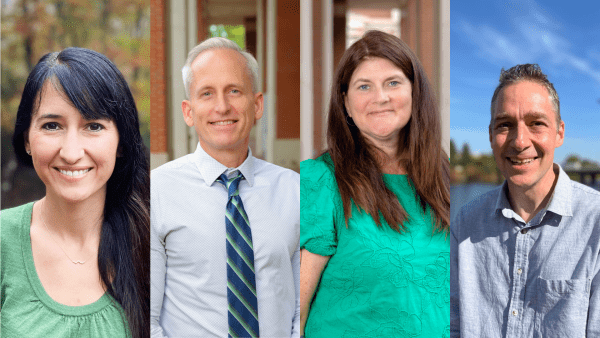Project Teaching Our Rich Cultural Heritage: UNC Charlotte awarded $1.5M grant to partner with Eastern Band of Cherokee Indians for teacher licensure program

The University of North Carolina at Charlotte has been awarded $1.5 million from the U.S. Department of Education’s Office of Indian Education to support Project Teaching Our Rich Cultural Heritage, a five-year collaboration with the Eastern Band of Cherokee Indians, located in western North Carolina. The project will prepare highly qualified educators who are culturally and linguistically equipped to serve Cherokee students, directly supporting the EBCI’s efforts to revitalize its language and culture. Kristin Davin, professor of world language education, will serve as principal investigator, with Debra Diegmann and Scott Kissau as co-PIs and a host of both Charlotte and EBCI leaders as key personnel.
Origin of the Project and Need
Project TORCH was established to address a critical challenge facing the EBCI community: the need for culturally and linguistically knowledgeable teachers in schools serving a high proportion of EBCI students. The EBCI, one of three federally recognized Cherokee tribes, is working to preserve its language, which currently has fewer than 200 fluent speakers. Partner schools, including the New Kituwah Academy, Cherokee Central Schools and Graham County Schools, struggle to find Indigenous teachers, so the number of students being taught their tribe’s language has been steadily on the decline, as there is rarely a formal environment for them to learn.
Principal investigator Kristin Davin met Charlotte colleague Alex Dornburg during a NEXUS forum intended to foster interdisciplinary research collaboration. Dornburg shared his interest in researching species extinction, and Davin discovered how similar it was to her research in language extinction and revitalization. They received a University-based Ignite grant to study language revitalization in Cherokee, beginning a year-long collaboration that brought teachers both from outside and inside the EBCI community together for language teaching workshops and a summer STEM camp for teachers. Davin emphasized that this early work with Dornburg and fellow Cato College faculty member Joan LaChance was foundational for Project TORCH, as building initial trust between the University and the EBCI community is what will allow this work to succeed.
Grant Purpose and EBCI Collaboration
The grant supports Project TORCH’s three core goals:
- Increase the number of qualified EBCI teachers in schools that serve a high proportion of Cherokee students
- Prepare teachers to meet the specific cultural, linguistic and learning needs of Cherokee students
- Support retention of program completers
Project TORCH will recruit, graduate and support 12 enrolled EBCI members, with grant funds supporting the full life cycle of their recruitment, studies and support for early years of teaching. The project offers two flexible, online pathways to North Carolina teaching licensure: the two-year elementary education program (TA to Teachers) for those with an associate degree, and a two-year K-12 graduate program (Graduate Certificate/Master of Arts in Teaching).
Threaded throughout the program is guidance from EBCI partners and the Cherokee Speakers Council. The curriculum features specialized in-person summer courses held in Cherokee, North Carolina. These sessions will be co-taught by University faculty and respected EBCI Elders to enable instruction that honors Indigenous ways of knowing. Monthly in-person cohort meetings, led by EBCI Elders, will build a strong community of support and provide necessary tutoring.
The partner school districts have committed to hiring the qualified program completers. To ensure long-term success, graduates receive two years of research-informed support, including instructional coaching from the NC New Teacher Support Program and essential in-school support from a qualified, school-based EBCI mentor.
Potential Impact
The 12 EBCI teachers who complete the program will be specifically prepared to implement Indigenous, culturally responsive teaching practices that integrate Cherokee language, culture and ways of knowing.
These new educators will fill crucial vacancies and serve EBCI students across the partner districts. The presence of culturally congruent EBCI role models is expected to improve overall school performance, enhance academic outcomes and support higher graduation rates for Indigenous youth. With robust two-year retention support, these teachers are expected to remain in the profession, collectively serving thousands of students over time and creating a valuable pool of future EBCI mentor teachers to sustain culturally enriching educational practices in their community.
Davin summed up, “Our role there is not to impress upon the Cherokee Western ways of knowing and learning, but to serve as a conduit through which the Cherokee can earn the state licensures they need for their teachers while making sure we acknowledge, respect and integrate Cherokee values and ways of knowing.”